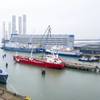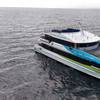ExxonMobil Talks With Teekay Ahead of IMO 2020
The International Maritime Organization (IMO) has mandated a global 0.50% cap on the maximum level of sulphur in marine fuel. This new cap represents a significant reduction – down from the current 3.50% limit – and presents the marine industry with compliance challenges.
Starting from January 1, 2020, vessel operators will need to use a compliant fuel, or have a scrubber fitted if they wish to continue burning high-sulphur fuel oil. This ruling does not affect Emission Control Areas (ECAs), where a 0.10% sulphur fuel is still required.
ExxonMobil anticipates that the vast majority of the industry will choose a low-sulphur fuel to meet the new IMO 2020 cap. However, there is no single route to compliance. Options include:
- ExxonMobil’s range of low-sulphur EMF.5 Engineered Marine Fuels
- ExxonMobil Premium HDMG 30 low-sulphur marine fuel in the Port of Singapore
- Low-sulphur distillates such as marine gas oil (MGO)
- Premium Emission Control Area (ECA) fuels
- The continued use of high-sulphur fuel oil (HSFO) in conjunction with a scrubber
- Liquefied natural gas (LNG) or liquefied petroleum gas (LPG)
Operators will need to make their decisions on a vessel-by-vessel basis. Determining the most effective option will be based on an evaluation of factors such as vessel type, route, age and engine. ExxonMobil will also supply a complementary range of cylinder and engine oils. These will include:
- Mobilgard 540, a new 40BN formulation for vessels using low-sulphur fuels
- Mobilgard M420, a newly formulated 20BN Trunk Piston Engine Oil (TPEO)
- A high-BN cylinder oil for vessels using a scrubber
- An ultra-low-BN grade for vessels using LNG
Successful compliance with the IMO 2020 emission regulation requires more than fuel selection – preparation for the switchover is also essential.
Initially, some fuel types may be scarce. Vessel operators will therefore need to plan their bunkering in advance as we move from fuel procurement to fuel management. As a result of fuel choice, operators may need to revisit their cylinder oil selection.













